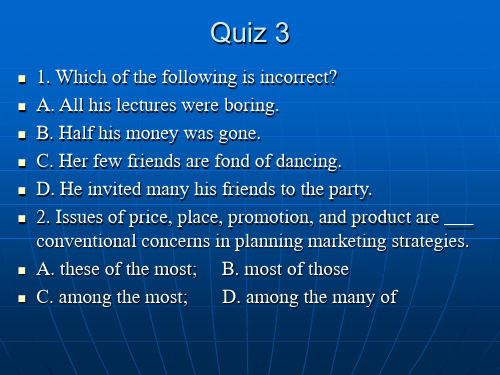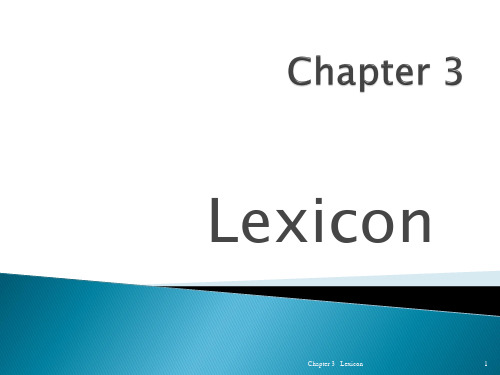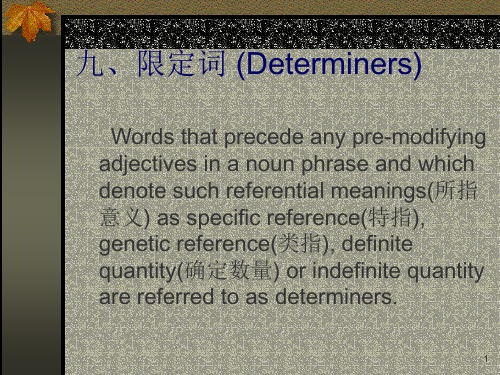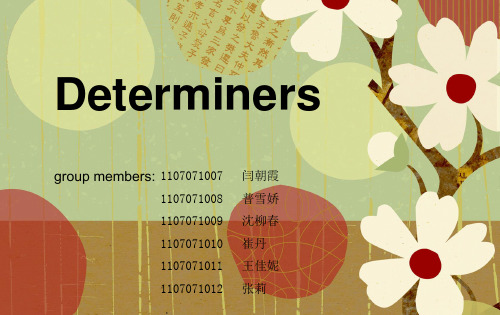Exercise for determiners or indefinite pronouns
限定词

all VS whole
The predeterminer all and the quantity partitive whole appear in parallel expressions. In the whole of, the of, definite article is obligatory. The use of all (of) the and the whole (of) is far from straightforward. 1. all, all the, or the whole is used with temporal nouns. all (the) day/morning/week the whole day/morning/week all of the + temporal nouns is rather uncommon. * all of the day/hour/week
Determiners
Definition: Words that precede any premodifing adjectives in a noun phrase and which denote such referential meanings as specific reference, generic reference, definite quantity or indefinite quantity are referred to as determiners.
All the or the whole is used with other count nouns that are understood to be divisible. all the family/way/story the whole family/way/story
英语语法教程4.Noun and Noun Phrase (3) Case and Gender of the Noun

B) Similar to Chinese, the gender of an English noun is identical to its natural sex and not marked by any inflection. Let’s compare the following examples: 1) 汉语:这(个)小姑娘很漂亮。 2)英语:This little girl is very pretty. 3)德语:Das Mädchen ist sehr schön. 4)意大利语:Questa bambina è molto bena. Both in Chinese and English, no inflection occurs in the whole sentence to match the gender of the subject, which can be found in German (neutral gender for little girls) and Italian. (feminine gender).
Noun and Noun Phrase (3) Case and Gender of the Noun
4.1 Four types of case forms: nominative case, objective case, possessive case and common case.
A) The possessive case is also called genitive case, including the -s genitive, the of genitive and the double genitive, which is a combination of the other two. B) Note the inflected forms of the -s genitive and their uses.
胡壮麟语言学第三章课件

Chapter 3 Lexicon
15
3.1.3 Classification of words
definitions: word: the minimum free form of a language closed-class: one whose membership is fixed or limited (no new members can be added.) open-class: one whose membership is in principle indefinite or unlimited (new members can be added.) word class: part of speech
Chapter 3 Lexicon 17
3.1.3 Classification of words Today, word class displays a wider range of more precisely defined categories. Here are some of the categories newly introduced into linguistic analysis.
In order to reduce the ambiguity of the term "word", the term LEXEME is postulated(假定)as the abstract unit underlying the smallest unit in the lexical system of a language, which appears in different grammatical contexts. For example, "write" and "fat" are the lexemes of the two sets of words in ex. 3-3 respectively.
九限定词DeterminersP上课讲义

6
但实际上, what 也用来指确定数目的“什么”, 比如一 年有四季, 十二个月, 一星期有七天, 等等:
What season do you like best?
We had a party last month, and it was a lot of fun, so let’s have another one this month.
his, her, our, their, one’s, its Genitive Noun(名词属格): John’s, my friend’s Demonstrative Determiner (指示限定词): this,
that, these, those, such Relative Determiner(关系限定词): whose,
3
in the following lecture in details. Here we’re going to concentrate on the other kinds of determiners.
2、 A comparative study of some determiners
a(n) & one
both & all
两个词均可译作“都”,但是指两个人或物时只能用 both,
三个及其以上的人或事物时要用 all:
4
▪ Whole 后面不能接复数可数名词, 代词或专有名词: We can’t say:whole inhabitants (全体居民)or whole China,or whole it. But we can say:all the inhabitants, the whole of China(指领土), or all China(指各地区或全国同胞), the whole of it.
英语专四语法 限定词

(2)只能与名词单数搭配的限定词
有 些 限 定 词 如 a(n) , one , another , each , every , either , neither,many a,such a等只能与单数名词搭配。例如:
each worker neither sentence another book
疑问限定词( Interrogative Determiner ): what , which , whose
不定限定 词 ( Indefinite Determiner ) : no , some , any , each , every , enough , either , neither , all , both , half , several,many,much,(a) few,(a) little,other,another
EXERCISES 3.1A
在名词词组中心词之前如果有两个或两个以上限定词 出现时,就会产生限定词的先后顺序问题。按其不同的搭 配位置,限定词可分为:
(1)中位、前位、后位限定词
按照限定词和限定词之间的不同搭配位置,限定词可分为中位 限定词(Central Determiner)、前位限定词(Predeterminer)和 后位限定词(Postdeterminer)。
a) 中位限定词包括a (n),the,zero;this,that,these,those; my , your ,等; Mary’s , my friend’s ; some , any , no , every , each , either , neither , enough ; what (ever) , which (ever) , whose等。
英语的限定词包括:
determners 英语语法 限定词

Part 2
1,Central determiners, predeterminers and postdeterminers 1)Central include:article, demonstrative determiners, possessive determiners, genitive nouns, some, any, every, either... 2)Predeterminers nclude:all, both, half, double, twice, what, such... ●
Determiners
group members: 1107071007
1107071008 1107071009 1107071010 1107071011 1107071012 闫朝霞 普雪娇 沈柳春 崔丹 王佳妮 张莉
What is determiners?
Words that precede any premodifying adjectives in a noun phrase and denote such referential meanings as specific reference(特指) , generic reference(类指), definite quantity(确定数量) or indefinite quantity(非确定数量) are referred as determiners.
●
This/that boy 7, Determiners with plural and noncount nouns only. Such as plenty of, most, other Plenty of milk most pigs other rabbits
十大英语成分英语表达
十大英语成分英语表达English Answer:1. Nouns are the building blocks of sentences, naming people, places, things, or concepts. They can be common or proper, concrete or abstract, singular or plural.2. Pronouns take the place of nouns, making sentences more concise and avoiding repetition. They can be personal, possessive, demonstrative, interrogative, indefinite, or reflexive.3. Verbs express actions, occurrences, or states of being. They can be transitive or intransitive, active or passive, regular or irregular.4. Adjectives describe nouns, providing more information about their qualities, characteristics, or attributes. They can be positive, comparative, or superlative.5. Adverbs modify verbs, adjectives, or other adverbs, expressing how, when, where, or to what extent. They can be used to describe manner, time, place, frequency, certainty, or degree.6. Prepositions show the relationship between a noun or pronoun and another word in the sentence. They can indicate location, direction, time, possession, or cause.7. Conjunctions connect words, phrases, or clauses, creating a logical flow within sentences. They can be coordinating (e.g., and, but, or) or subordinating (e.g., because, although, that).8. Interjections are exclamatory words or phrases that express strong emotions or reactions. They are often usedin spoken language and can be written with exclamation marks (!) for emphasis.9. Articles are determiners that precede nouns, specifying whether a noun is specific or general. They canbe definite (the) or indefinite (a, an).10. Auxiliary verbs help the main verb express tense, mood, or voice. They include modal verbs (e.g., can, may, must), have, has, had, do, does, and did.Chinese Answer:1. 名词是句子的基本组成部分,表示人、地点、事物或概念。
det.用法 -回复
det.用法-回复Determiners are words that precede and modify nouns, providing more specific information about the noun in question. They help to clarify whether the noun is definite or indefinite, and can indicate quantity, possession, or attribution. In this article, we will explore the different uses and functions of determiners in the English language.1. Definite and indefinite articles:The two most common determiners are "a/an" and "the." "A" and "an" are indefinite articles, used to introduce something for the first time or to refer to a general or non-specific item. For example, "I saw a dog in the park." On the other hand, "the" is a definite article that identifies a specific item or refers to something that has been previously mentioned. For instance, "The dog barked loudly."2. Demonstrative determiners:Demonstrative determiners, such as "this," "that," "these," and "those," are used to point out specific objects or entities. "This" and "these" refer to something close in space or time, while "that" and "those" refer to something further away or in the past. For instance, "This book is interesting."3. Quantifiers:Quantifiers express the quantity or amount of a noun. Examples include "some," "many," "few," "several," "a lot of," "plenty of," and "no." They provide information about whether the noun is singular or plural and whether it is countable or uncountable. For example, "She has some books on her shelf."4. Possessive determiners:Possessive determiners indicate ownership or possession of a noun. These include "my," "your," "his," "her," "its," "our," and "their." They clarify who the object belongs to. For instance, "His car is parked outside."5. Interrogative determiners:Interrogative determiners are used to ask questions about nouns. Examples include "which," "what," and "whose." They initiate a query relating to the noun. For example, "Whose coat is this?"6. Indefinite determiners:Indefinite determiners provide non-specific information about a noun. Examples include "any," "some," "another," "each," "every,""either," "neither," and "both." They can be used to indicate an unknown or unlimited quantity. For instance, "Can I have some sugar, please?"7. Numeric determiners:Numeric determiners indicate precise numerical values or amounts. Examples include "one," "two," "three," and so on. They tell us the exact number of objects or entities. For example, "My aunt has three cats."Determiners are an essential part of English grammar since they modify nouns in specific ways, providing additional information or context. Understanding their functions and uses helps to enhance clarity and accuracy in communication. By carefully applying determiners, we can convey precise meanings and intentions in our writing and speech.。
限定词、介词
限定词、介词Classes of Determiners(限定词)1.Articles: Definite, Indefinite and Zero rticles (冠词:定冠词、不定冠词和零冠词)2.Quantifiers (数量词)3.Other Determiners (其他限定词)⼀.Articles: Definite, Indefinite and Zero rticles (冠词:定冠词、不定冠词和零冠词)1. 不定冠词主要表⽰泛指和与one 同源,含"⼀"的意思。
a ⽤在以辅⾳⾳素开头的名词前,an ⽤在以元⾳⾳素开头的名词前,如:a university a man a bookan umbrella an egg an honest child2. 定冠词the 主要表⽰特指的⼈或物及第⼆次提到的⼈或物,或世界上独⼀⽆⼆的东西,如:the sun the moon the world the earth和形容词连⽤,代表⼀类⼈,如:the blind the dead the poor the richhe wounded the young the unemployed3. 在下列情况下不⽤冠词:a. 特殊的专有名词前,如:John Smithb. 物质名词表⽰类别时,如:Gold is a precious metal.c. 抽象名词表⽰泛指时, 如:Knowledge is power.d. 在季节、⽉份、⽇期、节⽇前,如:Februarye. 在餐名、运动、游戏等名词前,如:Sports is good for health.f. 在school, hospital, church, prison等词前,当这些词着重表⽰功⽤⽽不是这些建筑物或物体本⾝时,如:She went to school at seven.(但She went to the school to see her teacher.)g. 在表⽰"种类"的短语,如:a kind (sort) of tree,two kinds (sorts) of books.h. 带有表⽰顺序的基数词前,如:Lesson One (但the First Lesson).i. 表⽰独⼀的职位,头衔等的名词前,如:He was elected president of the society.⼆.Quantifiers (数量词)1.many, much, (a) few, (a) littlea. many, (a) few 只⽤于可数名词前,much, (a) little 只⽤于不可数名词前,如:many (a few, few) booksmuch (a little, little) waterb. many 和much 主要⽤在否定句和疑问句中,但它们前⾯加too 或so时就多⽤在肯定句中,如:We didn't spend much money.How many books do you have?You made too (so) many mistakes.c. a few (= several) 和a little (= some) 含肯定意义;few (= not many) 和little (= not much)含否定意义。
Determiners(2)--articles
2.2 Specific reference: The articles are used to refer to a particular thing or person in the general class rather than all the things or people as a whole. For example:
The book on the desk is not mine. The international community strongly accused this terrorist attack.
• Definite specific reference: a person or object can be identified uniquely in the context or according to the knowledge shared by the speaker and listener. (the)
The teaching building opens at 6:00 and closes at 23:00. The screen in this class room needs cleaning.
• Indefinite specific reference: a person or object can also be identified, but not very definitely. (a)
forward) and situational specific reference. • Anaphoric reference: what has occurred in the previous context occurs again and the definite article has to point backward for its meaning. There is a TV in the room. On the TV, lies the remote controller. There were a man and a woman in the room. The man was tall and handsome, and the woman were slender and beautiful. • Cataphoric reference: The article has to go forward for its referential meaning. This is the place where I met him. This is the student I told you about.
- 1、下载文档前请自行甄别文档内容的完整性,平台不提供额外的编辑、内容补充、找答案等附加服务。
- 2、"仅部分预览"的文档,不可在线预览部分如存在完整性等问题,可反馈申请退款(可完整预览的文档不适用该条件!)。
- 3、如文档侵犯您的权益,请联系客服反馈,我们会尽快为您处理(人工客服工作时间:9:00-18:30)。
Exercise for determiners or indefinite pronouns
Fill in the blanks with appropriate determiners or corresponding indefinite pronouns semantically related to quantity:
1.A: Do you need more milk?
B. No, there is too _____ already.
2. A: Should we get some tomatoes?
B: No, but not as _____ as that.
3.H e seldom uses _____ paper to start a fire.
4.I can’t open this lock. There must be __some___ key that will open it.
5.She wanted _____ stamps, but there aren’t _____ in the machine.
6.This medicine is on sale everywhere. You can get it at _____
chemist’s.
7.______ people will believe _____ story you tell them.
8.We don’t have to buy any more eggs. There are a great _____ left in
the fridge.
9.Quite a ____ girl students major in English.
10.B ob is rather selfish. He has _____ thought about other people’s
interests.
11.h e gained more marks for English. There were _____ mistakes in his
composition.
12.A truck collided with a car. The car was totally damaged, but _______
damage was done to the truck.
13.O n ____ side of the street there were assembled a lot of soldiers.
14.A: Which of these two novels would you like?
B: I don’t like _____ of them. I am interested in ______ one.
15.T here are two Germans in his class. _____major in economics.
16.T here were hundreds of people at the show. ____ spoke highly of the
exhibition.
17.A ll the staff members were requested to do something for the
organized charities (慈善事业), but ___ contributed to the fund.
18.W hen the ship was sunk, all the sailors were drowned, ____ one of
them.
19.T he president got down from the plane and shook hands with _______
one waiting at the airport.
20.A: Which of all these would you like?
B. I wouldn’t kike _____ of them. They _____ look too old.。
